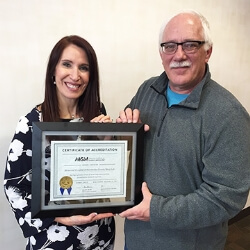MHSC Sleep Lab gains accreditation
- Category: Awards & Recognitions
- Posted On:
A sleep study can help target medical issues
Rock Springs — Sleep disorders are abundant and varied — there are dozens of different types, and most go beyond simple snoring.
Many of them can be improved with lifestyle changes and quality sleep.
A good night’s sleep is important to overall health and well-being. A sleep study at Memorial Hospital of Sweetwater County’s accredited Sleep Lab can help get you there.
“When you can’t sleep well, sometimes the cause is a medical problem,” said MHSC Cardiopulmonary Services Director Crystal Hamblin. “Other times, sleep disorders can lead to significant health problems.”
Here are some of the illnesses sleep professionals have diagnosed over the years:
- Congestive heart failure: Central sleep apnea syndrome is common in people with congestive heart failure. The problem is not an airway blockage but can indicate a problem in the brain or heart.
- Obstructive sleep apnea: The airway from the back of the nose, down to the throat collapses during sleep, narrowing the breathing passage and repeatedly blocks the airway. When the airway collapses, air cannot get to the lungs. Your brain wakes you up to breathe, leading to a brief arousal that fragments your sleep and causes poor sleep quality. This cycle can repeat hundreds of times in one night, and typically is not remembered in the morning. This can lead to high blood pressure, increasing your risk of having a heart attack, heart failure, and stroke. It also may be associated with rhythm disturbances — a common one being atrial fibrillation.
- Insomnia: A sleep study can help define something that may have been overlooked if treatment for insomnia is not working.
- Restless Leg Syndrome: This is an overwhelming feeling or urge to move your legs. It occurs just at bedtime and not typically during other parts of the day. Sleep studies do not usually help in this diagnosis but can help with some of the movement disorders that can occur during sleep.
- Excessive sleepiness: This includes narcolepsy and idiopathic hypersomnia.
- Parasomnias: This includes unusual events or experiences that can happen when sleeping — such as sleepwalking, nightmares, sleep-related eating disorders, and dream-enacting behavior.
- Circadian rhythm sleep-wake disorders: This can include shift worker disorder and jet lag, which occurs when traveling across time zones.
- Depression, anxiety & other mental health disorders: These can raise the risk of sleep disorders.
- Weight Problems: Increased weight can aggravate sleep disorders, particularly obstructive sleep apnea.
All of MHSC’s sleep therapists are certified and registered in respiratory therapy and sleep technology. They perform and score the studies to obtain quality data for the physician to interpret, Hamblin said.
Once you’ve had a sleep study, it will be read by Dr. Patrick Plummer, an American Academy of Sleep Medicine board-certified physician who has been reading sleep studies for more than 15 years.
It is important to note that Sweetwater Memorial has had a Sleep Laboratory for more than 20 years and is the only American Academy of Sleep Medicine accredited Sleep Lab in Sweetwater County. By achieving accreditation, a sleep facility demonstrates a commitment to evidence-based diagnosis of sleep disorders, as well as the provision of quality diagnostic services, Hamblin said.
Recognizing that the accreditation leads to improvements in patient care, public and private health insurance providers are requiring that sleep studies be performed at an accredited facility, she said. AASM accreditation indicates to patients and referring physicians that the sleep center at MHSC is dedicated to providing the highest patient care in sleep medicine.
The professionals at Sweetwater Memorial Sleep Lab can help. Call (307) 352-8390.



